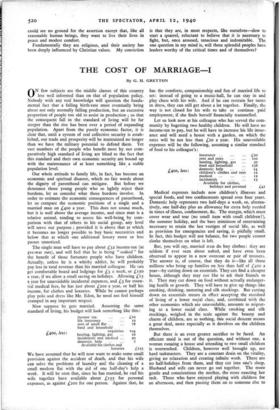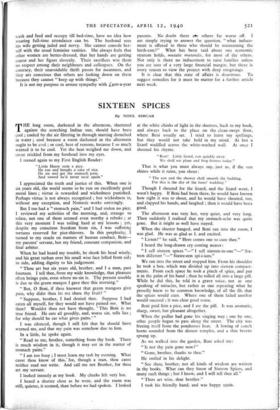THE COST OF MARRIAGE -I
By G. H. GRETTON
ON few subjects are the middle classes of this country less well informed than on that of population policy. Nobody with any real knowledge will question the funda- mental fact that a falling birth-rate must eventually bring about not only normally falling production, but an excessive proportion of people too old to assist in production ; so that the consequent fall in the standard of living will be far steeper than the rise has been over a period of expanding population. Apart from the purely economic factor, it is clear that, until a system of real collective security is estab- lished, our trade and prosperity will be maintained no longer than we have the military potential to defend them. Yet vast numbers of the people who benefit most by our com- paratively high standard of living are blind to the fact that this standard and their own economic security are bound up with the maintenance of at least something like a stable population level.
Our whole attitude to family life, in fact, has become an economic and spiritual disaster, which no fair words about the dignity of parenthood can mitigate. But before we denounce those young people who so lightly reject their burdens, let us consider what those burdens involve. In order to estimate the economic consequences of parenthood, let us compare the economic positions of a single and a married man on L400 a year. This does not sound much, but it is well above the average income, and since man is a relative animal, tending to assess his well-being, by com- parison with that of others in his social group, any level will serve our purpose ; provided it is above that at which it becomes no longer possible to buy basic necessities and below that at which one additional luxury more or less passes unnoticed.
The single man will have to pay about £32 income-tax (at pre-war rate), and will feel that he is being " soaked" for the benefit of those fortunate people who have children. Actually, unless he is a whisky addict, he will probably pay less in total revenue than his married colleague. He can get comfortable board and lodgings for £3 a week, or krso a year, if we allow a small saving on holidays. Allowing £15 a year for unavoidable incidental expenses, and £3 for essen- tial medical fees, he has just about £200 a year, or half his income, for clothes and luxuries. While he cannot perhaps play polo and dress like Mr. Eden, he need not feel himself cramped in any important respect.
Now suppose he gets married. Assuming the same standard of living, his budget will look something like this: income tax x o
life insurance 10 rent of small flat .. 78 food and household requisites 104 heating, lighting, gas ... 16 incidentals and medical ... zo domestic help ... 7 Available for clothes and luxuries £155
We have assumed that he will now want to make some small provision against the accident of death, and that his wife can solve the problems of laundry and the cleaning of a small modern flat with the aid of one half-day's help a week. It will be seen that, since he has married, he 2nd his wife together have available about kr55 for personal expenses, as against £200 for one person. Against that, he £400, less: has the comforts, companionship and fun of married life to set: instead of going to a music-hall, he can stay in and play chess with his wife. And if he can restrain her tastes in dress, they can still get about a lot together. Finally, the way is not closed for his wife to take or continue paid employment, if she finds herself financially trammelled.
Let us look now at his colleague who has served the com- munity by begetting two healthy children. He will have no income-tax to pay, but he will have to increase his life insur- ance and will need a house with a garden, on which the rates will be not less than £20 a year. His unavoidable expenses will be the following, assuming a similar standard of food to his colleague's:
" ••' rent and rates • heating, lighting, gas ...
food and household • • • domestic help ... • • • children's clothes and toys medical ... incidentals Available for clothes,
holidays and personal £41 Medical expenses include now children's illnesses and special foods, and two confinements spread over four years. Domestic help represents two half-days a week, or, alterna- tively, one half-day plus an allowance for extra help needed in times of illness, confinement, &c. The margin, which must cover wear and tear (no small item with small children!), the summer holiday, and the bare minimum of entertaining necessary to retain the last vestiges of social life, as well as provision for emergencies and saving, is pitifully small. In fact, this budget will not balance, for two people cannot clothe themselves on what is left.
But, you will say, married men do buy clothes: they are seldom if ever seen about naked, and have even been observed to appear in a new overcoat or pair of trouser3. The answer is, of course, that they do it—like all those millions who bring up families on less than half of 1400 a year—by cutting down on essentials. They can find a cheaper house, although they may not like to ask their friends to it. They may cut down on food without actually endanger- ing health or growth. They will have to give up things like smoking, drinking, motoring and silk stockings. But cutting down on essentials means in effect accepting the standard of living of a lower social class, and, combined with the other economies which are unavoidable, amounts to migrat- ing to a lower social class. While smoking and silk stockings, weighed in the scale against the beauty and charm of children, are as nothing, this social descent means a great deal, more especially as it devolves on the children themselves.
But there is an even greater sacrifice to be faced. An efficient maid is out of the question, and without one, a woman running a house and attending to two small children is overworked. Children, however well brought up, are hard taskmasters. They are a constant drain on the vitality, giving no relaxation and creating infinite work. There are no half-holidays from them, and they cut into one's sleep. Husband and wife can never go out together. The more gentle and conscientious the mother, the more exacting her task. Those who have enjoyed playing with children for an afternoon, and then passing them on to someone else to £400, less:
insurance ... £20 100 30 156 14 12 12 15
wash and feed and occupy till bed-time, have no idea how wearing full-time attendance can be. The husband sees his wife getting jaded and nervy. She cannot console her- self with the usual feminine vanities. She always feels that other women are better-dressed, that her hands are getting coarse and her figure slovenly. Their sacrifices win them no respect among their neighbours and colleagues. On the contrary, their unavoidable thrift passes for meanness, and they are conscious that others are looking down on them because they cannot "keep up with things." It is not my purpose to arouse sympathy with £400-a-year parents. No doubt there ate others far worse off. I am simply trying to answer the question, "what induce- ment is offered to those who should be maintaining the birth-rate?" What has been said about one economic stratum holds, mutatis mutandis, for most of the others. Not only is there no inducement to raise families unless you are sure of a very large financial margin, but there is every reason to view the project with deep misgivings.
It is clear that this state of affairs is disastrous. To suggest remedies for it must be matter for a further article next week.



































 Previous page
Previous page